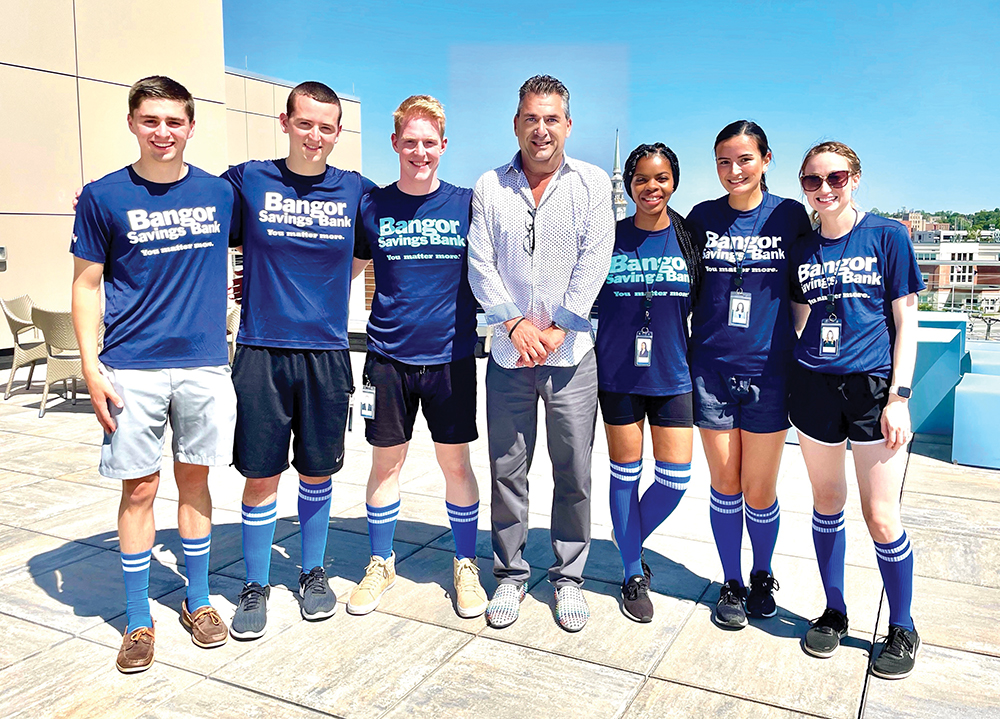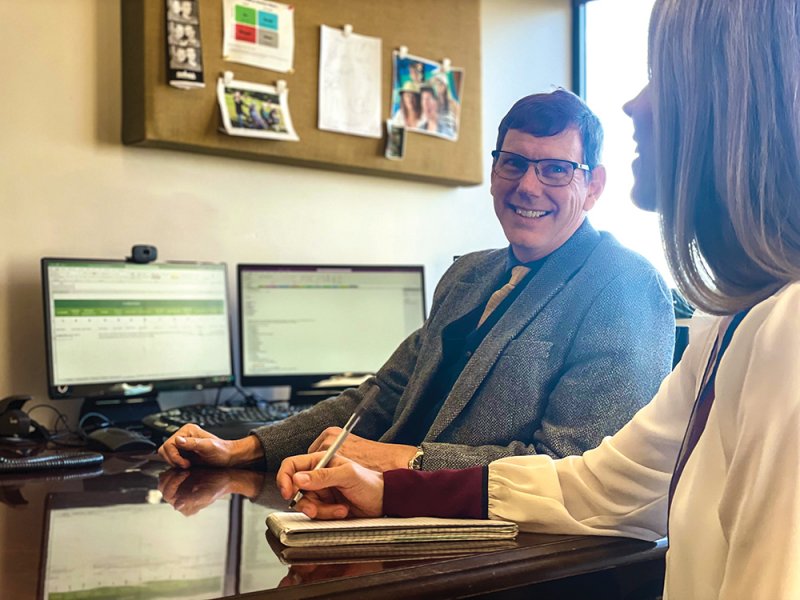 From left: Tate Porter; Joshua Cowing; Duncan McDougal; David Pease, SVP, director of talent, diversity, and inclusion; Josephine Katandula; Jada Lin; and Brandi McKay-Berry, management trainees at Bangor Savings Bank. Courtesy photo.
From left: Tate Porter; Joshua Cowing; Duncan McDougal; David Pease, SVP, director of talent, diversity, and inclusion; Josephine Katandula; Jada Lin; and Brandi McKay-Berry, management trainees at Bangor Savings Bank. Courtesy photo.
In a tight labor market, where it can take months to fill a post, employers are using coaching and mentoring programs to keep current employees engaged, to be able to promote from within and to develop the labor pool they need.
“We have a whole host of programs at Bangor Savings Bank, which are critical in the long-term success of employees,” says Ryan Albert, director of human resources and employee development. “Every new hire is assigned a buddy, drawn from a group of experienced staff who help them adapt and feel part of our culture. It lasts formally for a year, but those relationships last well beyond.”
Bangor Savings has more than 1,100 employees and continues to open locations in NH, making effective development programs essential. Albert says there is a leadership committee of 16 C-suite and director-level staff who work with mentees on anything from career guidance to personal advice.
“Folks can informally request a mentor. We also have managers in training, and they are assigned an executive mentor,” Albert adds. “We want everyone to be successful, and we strive to promote from within.”
At Southern NH University (SNHU), with a workforce of about 6,500, every leader is a coach, says Phil Nazzaro, associate vice president of talent development. “The growth and development of the people under a leader’s charge is a crucial component of the work of our leaders,” he says.
To support this, SNHU teaches leaders how to hold strong growth conversations, and help team members reflect on work after it is completed. “We also offer formal coaching relationships through a variety of programs including six-month executive coaching opportunities for leaders and formal coaching through the Center for Creative Leadership for the members of our 10-month executive preparation program, Pinnacle Leadership,” he says.
Nazzaro says mentoring happens within departments, such as the Global Campus and Student Experience teams. SNHU is also looking at how mentoring can be leveraged to support succession planning.
ITR Economics in Manchester has a formal system that pairs an employee with a more senior team member to help them advance a specific skill. A skill kickoff meeting is held with a mentor, mentee and a corporate learning administrator to ensure both team members are set up for success. Milestones are clearly identified so everyone is aware of the desired outcome. The mentoring program allows team members to receive dedicated time from subject matter experts, learn new skills, advance their careers and receive pay raises based on these new skills.

ITR Economics’ COO Rich Westrick, mentoring Senior Accountant Briana Lannan. Courtesy photo.
PC Construction in Bedford had formal mentoring programs in the past but wanted to find a way to create a more effective mentoring program that focused on partnership and mutual learning and less on a structured process, says Eve Norris, vice president.
“In 2018, a team of PC leaders from all areas of the company spent a year researching industry mentoring programs and designing an informal and realistic model that PC could implement and embrace. Then we invited a small group of both mentors and mentees to participate in a pilot of the program. Now we are ready to launch company-wide after the first of the year. The program is flexible and is completely customized to the individual goals of each mentoring partnership,” she says.
Providing career opportunities and growth are important, says Becky Marden, director of career and professional development at SolutionHealth in Bedford, which includes Elliot Health System in Manchester and Southern NH Health in Nashua and employs about 6,500 people.
“We place a high priority on providing coaching services to our employees. We have a career and professional development component within the human resources department. Here we offer one-on-one coaching services by a certified professional coach to all employees across the health care system,” she says.
Marden says several staff take advantage of the program and reach out for assistance with career progression, job exploration, resume writing, interviewing skills, continuing education, placement into new roles and job shadowing. “We have even worked with a few employees with their retirement goals,” she says.
Marden says the mentoring program for nurses is designed to guide a mutual relationship between an experienced nurse (mentor) and a new nurse (mentee). “In today’s health care climate, we recognize that the transition from the role of student to nurse can be stressful, challenging and exciting. The program also serves as another way to ensure high quality of care,” she says.
St. Mary’s Bank in Manchester created an emerging leaders’ program in 2019. “It was a 10-month series that included a number of skill sets, such as effective communication,” says Pam Roy, senior vice president and HR director. “We wanted to take the sections on coaching and develop them into a new program.”
She says the credit union is in the final stages of rolling it out to all managers and supervisors. “We will require them to meet with employees monthly,” says Roy. “The idea is not to talk about tasks, outcomes or job performance but to talk about individual learning and development.”
BAE Systems in Nashua has about 6,000 employees and offers a variety of mentoring and development programs that empower employees to seek and maintain their own mentoring and coaching relationships, says a BAE Systems spokesperson.
“While we do not have a formal mentor assigned to every new hire, managers assign ambassadors as part of our New Hire Engagement Program to ensure new hires have a smooth, engaged and successful integration to the company. The overall intent of these coordinated efforts is to create a working environment that champions the values and culture of BAE Systems while boosting and accelerating the new hire’s assimilation into his or her new role,” says the spokesperson.
CCA Global in Manchester also has a number of mentorships for employees to connect with leaders company wide to reflect on and grow their career. Professional groups also exist to provide support and forums for employees to engage with others.
Women of CCA was launched during 2020 with a monthly webinar and discussion for female employees to support advancing women in the industry.

Members of the CCA Global Partners Women of CCA group. Courtesy photo.
MegaFood in Manchester offered an Emerging Leaders program in 2020. Employees participate in a two-day workshop, then receive mentoring from a leader outside of their department. Employees build a personal leadership development plan with goals that culminates with a presentation about their leadership journey.
Creating Career Tracks
Roy says with the challenges of the talent shortage, St. Mary’s is more focused on employee retention and development. “We do a lot to develop people internally. Wherever they may have an interest, they can take a course,” she says.
Roy adds St. Mary’s posts jobs internally for three days before advertising outside the credit union. “This is what the next generation is looking for. They want to have coaching; they want to know how and where within the organization they can sharpen their skill set. This is very big in our young professionals group,” she says.
There are several programs to encourage internal promotions and career tracking at SNHU, says Nazzaro. In some departments, jobs have levels with increasing responsibilities. In these departments, there are formalized opportunities to level up by demonstrating core competencies and living SNHU’s core values in their work.
“University-wide, we have recently launched a program that supports the career development of our team members, offering a set of activities and supports that help them discover their career passions, reflect upon and map out their career journeys, build the skills necessary for career growth, explore opportunities and teams across SNHU, plan short- and long-term growth goals at SNHU, and receive career coaching support from our internal team dedicated to this internal growth and mobility work,” he says.
Every PC Construction employee-owner has a defined career track and a development progression to ensure milestones are achieved, says Norris. “In addition, our engineer-in-training program, which has been in existence for over 40 years, helps young leaders gain the skills and experience necessary to progress from an entry level position to project management and field supervision roles. We also offer a multitude of in-house training and development options to provide opportunities for all team members to learn and grow, personally and professionally,” she says.
Coaching, mentoring and providing pathways for moving up the ladder don’t just have positive effects on companies and employees but are an important recruiting tool. “These programs are crucial,” says Norris. “When you look at overall job satisfaction, professional development and advancement rank among the highest importance. By continually focusing on
every employee, and their career goals and aspirations, you enhance the culture within the organization. People naturally want to do more and be better every chance they get. This is so empowering and is at the very root of our success.”
Nazzaro agrees, and says development is an important component of the benefits at SNHU. “When we look at what millennials and Gen Z are looking for in the workplace, it is purpose-driven work and the opportunity to grow,” he says.
“This is one of the first questions we get; folks are more interested than ever to know there is a career path for them,” says Albert of Bangor Savings Bank. “Our succession planning is really taking off. We had it for C-level, but now it goes four to five levels deep,” and there are development plans in place for those ready to step into a position when one becomes available.
“It is not linear at all, there are many different tracks you can take,” Albert says. “We will train to the technical skills; we want a people who fit our culture.”

 Current Issue - July 2024
Current Issue - July 2024